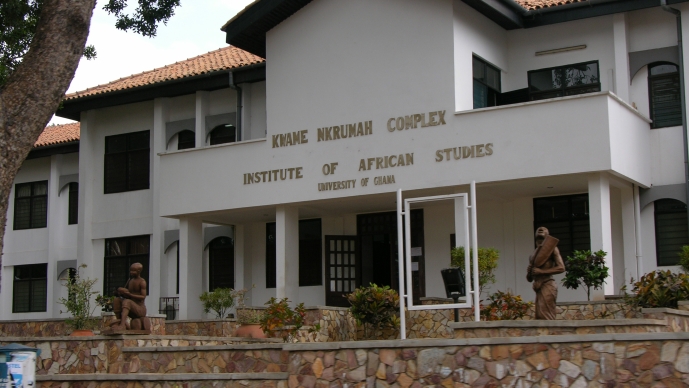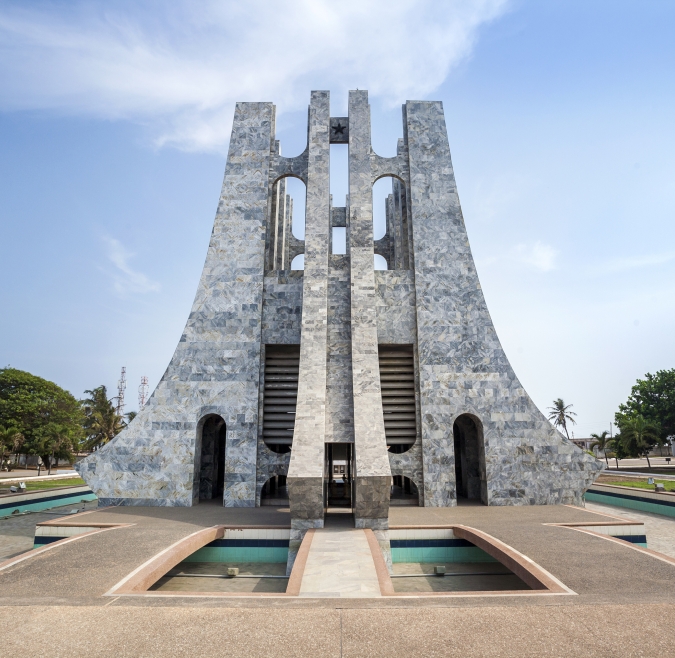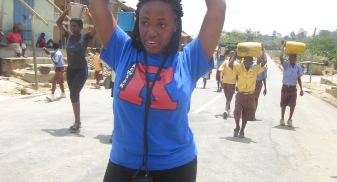University of Ghana (CIEE)
The Program
Don't miss the Access Africa scholarship!
Study through CIEE’s program at the University of Ghana, the oldest and largest public university in Ghana.
Check out the $4,000 Access Africa scholarship located in your Rutgers Global-Study Abroad application portal !!!
The University of Ghana is ranked 7th best university in Africa for its focus on humanities, basic and applied sciences, education, and health sciences. Immerse yourself in local Ghanaian culture, both through on-campus events and activities and in the surrounding community. Take advantage of CIEE’s many opportunities for service-based volunteer programs with local community organizations and NGOs.

Program Location

Ghana
Legon
The University of Ghana is located in Legon (a suburb of Accra). Legon’s well-educated citizens welcome American students with open arms to their quiet suburban town, just northeast of the city center in the Accra (capital of Ghana) Metropolis District. Students also enjoy access to a large shopping mall and several grocery stores, as well as restaurants and bars. Beyond campus, the equatorial region includes rainforests, wildlife parks, and pristine beaches to explore.
Academics
The University of Ghana (UG) is the oldest, most diverse campus community and largest university in the country. UG welcomes more than 53,000 students from more than 87 countries and about 1,250 faculty members from 22 countries. Programs include agriculture (featuring three research stations), consumer sciences, economics, computer science, engineering, performing arts, law, medicine, natural sciences, social sciences, nursing, public health, African studies, international relations, mathematics, journalism and communication, population studies, statistical research, social research, and economic research. The university follows a British model, which is less structured and requires students to take more responsibility and initiative. Professors expect students to spend significant time studying outside of class. In order to have an idea of what classes are available, check our the courses offered on the Arts & Sciences track and directly through University of Ghana.
Students also have access to CIEE Legon taught courses that are augmented with co-curricular experiential learning experiences. These may include site visits to relevant landmarks or locations in Ghana that illustrate contents explored during class sessions or hear from relevant guest speakers who will bring their expertise to show students a different cultural, academic, and professional perspective.
Note: Students will select their courses upon arrival. And, ASU online courses are not approved.
You will need to be sure that you are registered as a full time student according to CIEE and Rutgers University. That means you will need to take 15-18 credits while abroad. The credit translation system between CIEE and Rutgers University is 1:1, meaning a 3-credit course at CIEE will also be a 3-credit course on your Rutgers University transcript. You will receive 1-3 credits per class taken with CIEE. It is not possible to take classes not-for-credit or pass/fail.
For information about Study Abroad credit transfer, registration, and transcripts please visit the Academics section of our website.
Housing and Meals
Homestay with Ghanaian Family (standard housing*) — This option provides an excellent opportunity for immersion into the local culture and is strongly recommended for students who wish to take full advantage of their experience in Ghana. This includes a single or double bedroom with a shared kitchen, living room, and bathroom. Breakfast and dinner are provided during the week; breakfast, lunch, and dinner are provided on weekends. Lunches during the week are the responsibility of the student..
Since homestay families are located throughout greater Accra (beyond Legon), in most cases students are required to utilize public transportation to and from the University, a 30- to 45-minutes commute.
Select Plus Housing (additional cost*): Includes a single-occupancy air-conditioned room in apartment-style housing off-campus, located within 20 minutes from CIEE Legon. Meals are not included. Students prepare meals (facilities are limited) or eat on or off campus. Select housing requires an additional fee billed to the student directly from CIEE.
Financial Information
Program Costs
| NJ Resident | non-NJ Resident | |
|---|---|---|
| Program Cost | $22,000 | $26,200 |
| Wangari Maathai Scholarship | $-4,000 | $-4,000 |
| Final Cost (with Scholarship applied*) | $18,000 | $22,200 |
Program Cost includes:
• Tuition
• Standard Housing (Homestay)**
• Some meals (for homestay option)
• Program excursions
• Administrative Fees
• Emergency Medical Access Abroad
*Apply for the Rutgers Global-Study Abroad scholarship to receive the $4,000 Access Africa (Wangari Maathai Memorial fund) scholarship. This $4,000 scholarship will be applied to your Rutgers term bill as a credit towards your billed program cost (above).
** Should you request or be placed in housing outside of the standard placement, you will be responsible for the pricing difference. This includes, but is not limited to, placement in Select Plus single rooms.
Out-of-Pocket Costs
| Meals | $2,800 |
| Airfare* | See below |
| Local Transportation | $700 |
| Visa | $240 |
| Books and Classroom Materials | $150 |
| Personal Expenses | $250 |
| CIEE Deposit | $300 |
| Total | $4,440.00 |
Out-of-Pocket Cost includes:
*Apply for the CIEE Flight Credit Scholarship for Fall 2026 & Spring 2027 Up to $1500.
The above costs are estimations and represent the known out-of-pocket costs students encounter during their time abroad.
Some of these expenses will be paid for prior to going abroad, such as an airline ticket and visa costs, while some of these expenses, such as meals and local transportation, will be paid in-country as part of your daily expenses. As you plan, you will need to budget these costs and spend wisely throughout your time abroad.
Program Costs
| NJ Resident | non-NJ Resident | |
|---|---|---|
| Program Cost | $22,000 | $26,200 |
| Wangari Maathai Scholarship | $-4,000 | $-4,000 |
| Final Cost (with Scholarship applied*) | $18,000 | $22,200 |
Program Cost includes:
• Tuition
• Standard Housing (Homestay)**
• Some meals (for homestay option)
• Program excursions
• Administrative Fees
• Emergency Medical Access Abroad
*Apply for the Rutgers Global-Study Abroad scholarship to receive the $4,000 Access Africa (Wangari Maathai Memorial fund) scholarship. This $4,000 scholarship will be applied to your Rutgers term bill as a credit towards your billed program cost (above).
** Should you request or be placed in housing outside of the standard placement, you will be responsible for the pricing difference. This includes, but is not limited to, placement in Select Plus single rooms.
Out-of-Pocket Costs
| Meals | $2,800 |
| Airfare* | See below |
| Local Transportation | $700 |
| Visa | $240 |
| Books and Classroom Materials | $150 |
| Personal Expenses | $250 |
| CIEE Deposit | $300 |
| Total | $4,440.00 |
Out-of-Pocket Cost includes:
*Apply for the CIEE Flight Credit Scholarship for Fall 2026 & Spring 2027 Up to $1500.
The above costs are estimations and represent the known out-of-pocket costs students encounter during their time abroad.
Some of these expenses will be paid for prior to going abroad, such as an airline ticket, while some of these expenses, such as meals and personal expenses, will be paid in-country as part of your daily expenses. As you plan, you will need to budget these costs and spend wisely throughout your time abroad.

